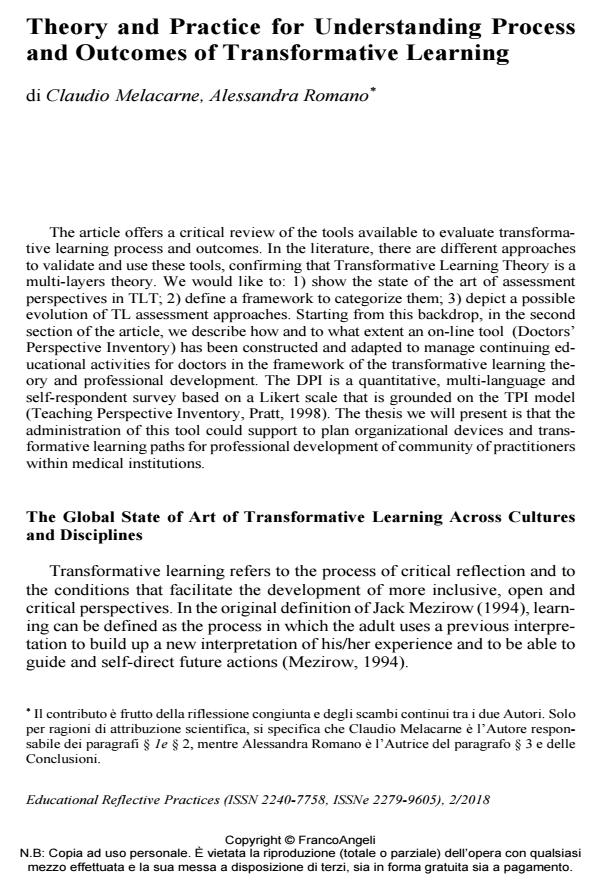Theory and Practice for Understanding Process and Outcomes of Transformative Learning
Titolo Rivista EDUCATIONAL REFLECTIVE PRACTICES
Autori/Curatori Claudio Melacarne, Alessandra Romano
Anno di pubblicazione 2019 Fascicolo 2018/2
Lingua Inglese Numero pagine 20 P. 214-233 Dimensione file 204 KB
DOI 10.3280/ERP2018-002014
Il DOI è il codice a barre della proprietà intellettuale: per saperne di più
clicca qui
Qui sotto puoi vedere in anteprima la prima pagina di questo articolo.
Se questo articolo ti interessa, lo puoi acquistare (e scaricare in formato pdf) seguendo le facili indicazioni per acquistare il download credit. Acquista Download Credits per scaricare questo Articolo in formato PDF

FrancoAngeli è membro della Publishers International Linking Association, Inc (PILA)associazione indipendente e non profit per facilitare (attraverso i servizi tecnologici implementati da CrossRef.org) l’accesso degli studiosi ai contenuti digitali nelle pubblicazioni professionali e scientifiche
The article offers a critical review of the tools available to evaluate transformative learning process and outcomes. In the literature, there are different approaches to validate and use these tools, confirming that Transformative Learning Theory is a multi-layers theory. We would like to: 1) show the state of the art of assessment perspectives in TLT; 2) define a framework to categorize them; 3) depict a possible evolution of TL assessment approaches. Starting from this backdrop, in the second section of the article, we describe how and to what extent an on-line tool (Doctors’ Perspective Inventory) has been constructed and adapted to manage continuing educational activities for doctors in the framework of the transformative learning theory and professional development. The DPI is a quantitative, multi-language and self-respondent survey based on a Likert scale that is grounded on the TPI model (Teaching Perspective Inventory, Pratt, 1998). The thesis we will present is that the administration of this tool could support to plan organizational devices and transformative learning paths for professional development of community of practitioners within medical institutions
- European Perspectives on Transformation Theory Claudio Melacarne, pp.193 (ISBN:978-3-030-19158-0)
Claudio Melacarne, Alessandra Romano, Theory and Practice for Understanding Process and Outcomes of Transformative Learning in "EDUCATIONAL REFLECTIVE PRACTICES" 2/2018, pp 214-233, DOI: 10.3280/ERP2018-002014